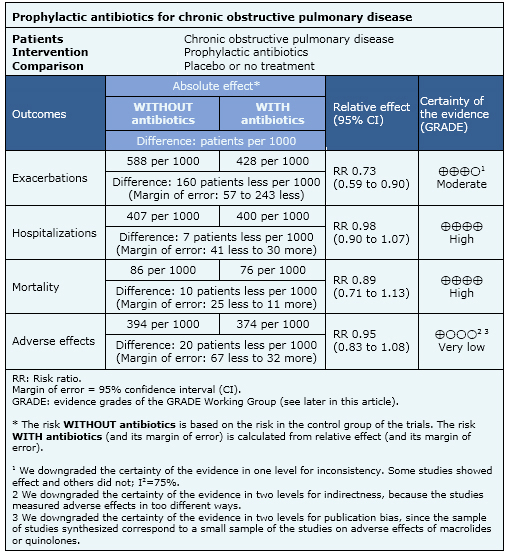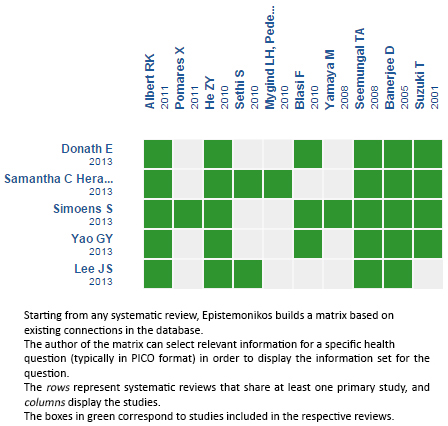Resúmenes Epistemonikos
← vista completaPublicado el 11 de noviembre de 2015 | http://doi.org/10.5867/medwave.2015.6309
¿Vale la pena utilizar antibióticos profilácticos en la enfermedad pulmonar obstructiva crónica?
Are prophylactic antibiotics useful in chronic obstructive pulmonary disease?
Abstract
Bacterial infections are one of the main causes of chronic obstructive pulmonary disease exacerbation, so the use of prophylactic antibiotics, especially macrolides, has been proposed in these patients. However, it is unclear whether antibiotics use is worth the risk and cost. Searching in Epistemonikos database, which is maintained by screening 30 databases, we identified five systematic reviews including eight randomized trials. We combined the evidence using meta-analysis and generated a summary of findings table following the GRADE approach. We concluded prophylactic antibiotics probably decrease exacerbations in chronic obstructive pulmonary disease, but have no effect on hospitalizations or mortality.
Problem
Exacerbations contribute substantially to morbidity and mortality in patients with chronic obstructive pulmonary disease. Since bacterial infections play a major etiologic role it has been proposed prolonged use of prophylactic antibiotics may reduce exacerbations. Apart from their antimicrobial role, it has been postulated that some antibiotics such as macrolides may also have an anti-inflammatory effect. On the other hand, the use of prophylactic antibiotics is associated with costs and adverse effects at both individual and population level.
Methods
We used Epistemonikos database, which is maintained by screening more than 30 databases, to identify systematic reviews and their included primary studies. With this information we generated a structured summary using a pre-established format, which includes key messages, a summary of the body of evidence (presented as an evidence matrix in Epistemonikos), meta-analysis of the total of studies, a summary of findings table following the GRADE approach and a table of other considerations for decision-making.
|
Key messages
|
About the body of evidence for this question
|
What is the evidence. |
We found five systematic reviews [1],[2],[3],[4],[5], considering 10 primary studies [6],[7],[8],[9],[10],[11],[12],[13],[14],[15], including eight randomized controlled trials [6],[7],[8],[9],[10],[12],[13],[14]. This table and the summary in general are based on the latter. |
|
What types of patients were included |
All studies included patients with FEV1/FVC <70% with moderate to very severe disease. Three studies included patients with a history of exacerbations in the previous months [6],[10],[13]. |
|
What types of interventions were included |
The antibiotic used was a macrolide in seven studies; azithromycin [6],[8],[10], clarithromycin [7] and erythromycin [9],[12],[14]; and a quinolone in only one study (moxifloxacin) [13]. Prophylactic antibiotics were administered continuously in five studies [6],[7],[9],[12],[14] and intermittently or pulsed in the other three [8],[10],[13]. Concomitant therapy was the following: inhaled corticosteroids alone in two studies [7],[12], theophylline plus inhaled anticholinergics in one study [14], inhaled corticosteroids plus inhaled anticholinergics and beta2 agonists in one study [6], inhaled corticosteroids plus inhaled beta2 agonists, inhaled anticholinergics and theophylline in one study [9], and concomitant therapy was not reported in three studies [8],[10],[13]. Seven studies used a placebo for comparison [6],[7],[9],[12],[13],[14]. |
|
What types of outcomes |
Different systematic reviews performed meta-analysis of the following outcomes:
|
Summary of findings
Information on the effects of prophylactic antibiotics in chronic obstructive pulmonary disease is based on eight randomized trials that included 3,315 patients. It was possible to obtain information on exacerbations in seven studies [6],[7],[8],[9],[12],[13],[14], on hospitalizations in three [6],[8],[13], on mortality in four [6],[8],[10],[13] and on adverse effects in seven [6],[7],[8],[9],[12],[13],[14].
- Prophylactic antibiotics probably reduce exacerbations in patients with chronic obstructive pulmonary disease. The certainty of the evidence is moderate.
- Prophylactic antibiotics do not reduce the risk of hospitalization in patients with chronic obstructive pulmonary disease. The certainty of the evidence is high.
- Prophylactic antibiotics do not reduce mortality in patients with chronic obstructive pulmonary disease. The certainty of the evidence is high.
- The risk of adverse effects of prophylactic antibiotics in patients with chronic obstructive pulmonary disease is not clear because the certainty of the evidence is very low.


Other considerations for decision-making
|
To whom this evidence does and does not apply |
|
| About the outcomes included in this summary |
|
| Balance between benefits and risks, and certainty of the evidence |
|
| What would patients and their doctors think about this intervention |
|
| Resource considerations |
|
|
Differences between this summary and other sources |
|
| Could this evidence change in the future? |
|
How we conducted this summary
Using automated and collaborative means, we compiled all the relevant evidence for the question of interest and we present it as a matrix of evidence.

Follow the link to access the interactive version: Prophylactic antibiotic therapy for chronic obstructive pulmonary disease
Notes
The upper portion of the matrix of evidence will display a warning of “new evidence” if new systematic reviews are published after the publication of this summary. Even though the project considers the periodical update of these summaries, users are invited to comment in Medwave or to contact the authors through email if they find new evidence and the summary should be updated earlier. After creating an account in Epistemonikos, users will be able to save the matrixes and to receive automated notifications any time new evidence potentially relevant for the question appears.
The details about the methods used to produce these summaries are described here http://dx.doi.org/10.5867/medwave.2014.06.5997.
Epistemonikos foundation is a non-for-profit organization aiming to bring information closer to health decision-makers with technology. Its main development is Epistemonikos database (www.epistemonikos.org).
These summaries follow a rigorous process of internal peer review.
Conflicts of interest
The authors do not have relevant interests to declare.

